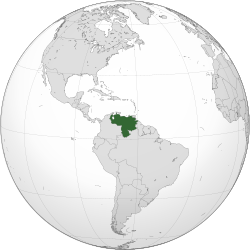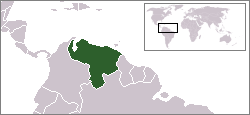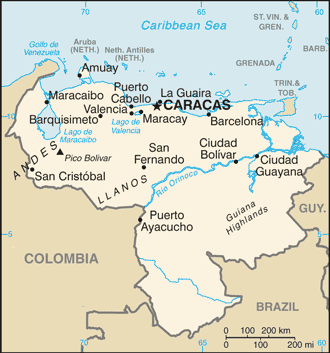Venezuela
Bolivarian Republic of Venezuela[1] República Bolivariana de Venezuela (Spanish) | |
|---|---|
| Motto: Ninguno [None] Traditional: Dios y Federación [God and the Federation] | |
| Anthem: Gloria al Bravo Pueblo (in Spanish) Glory to the Brave People | |
 Venezuela | |
| Capital and largest city | Caracas |
| National language | Spanish[2] |
| Ethnic groups |
|
| Demonym(s) | Venezuelan |
| Government | Federal presidential constitutional republic |
| Disputed | |
| Delcy Rodríguez | |
| Independence | |
• from Spain | 5 July 1811 |
• from Gran Colombia | 13 January 1830 |
• Recognized | 30 March 1845 |
| 20 December 1999 | |
| Area | |
• Total | 916,445 km2 (353,841 sq mi) (33rd) |
• Water (%) | 0.32[3] |
| Population | |
• 2011 estimate | 27,150.095 (43rd) |
• 2001 census | 23,054,985 |
• Density | 30.2/km2 (78.2/sq mi) (181st) |
| GDP (PPP) | 2010 estimate |
• Total | $346.973 billion[1] |
• Per capita | $11,889[1] |
| GDP (nominal) | 2010 estimate |
• Total | $285.214 billion[1] |
• Per capita | $9,773[1] |
| Gini (2010) | 39[2] medium |
| HDI (2011) | high · 73rd[3] |
| Currency | Bolívar[4][5] (VES) |
| Time zone | UTC– 4 (VET) |
| Driving side | right |
| Calling code | +58 |
| ISO 3166 code | VE |
| Internet TLD | .ve |
^ The "Bolivarian Republic of Venezuela" has been the full official title since the adoption of the new Constitution of 1999, when the state was renamed in honor of Simón Bolívar. ^ The Constitution also recognizes all indigenous languages spoken in the country. ^ Area totals include only Venezuelan-administered territory. | |

Venezuela is a country in northern South America. Its official name is República Bolivariana de Venezuela (Bolivarian Republic of Venezuela). The official language is Spanish, and the capital is Caracas.
The country has a wide range of geography including islands in the Caribbean Sea, coastal areas, highlands, and parts of the Andes Mountains. Venezuela is famous for being the home of Angel Falls, the world's tallest waterfall, in the Bolivar state.
Venezuela produces a large amount of oil every year, and it has one of the largest oil supplies in the world. The country has a very large supply of fossil fuels, gasoline, and minerals. Venezuela's economy is based on oil, cotton, cocoa, sugar, coffee, and tobacco.
Some other languages spoken in Venezuela are Carib, Guahibo, Warao, Wayuu, Pemon, and Piaroa. Most people are Roman Catholic at 96%, and a small minority is Protestant at 2%.
People and History[change | change source]
Ancient Venezuelans came from the east, west, south, and north. Christopher Columbus was the first European to enter Venezuela, but there were already people living there for a long time. The Spaniards first conquered Venezuela. Slaves were brought from Africa.
Venezuela's inhabitants are very racially mixed. This comes from the colonial period. When whites (the British, Spaniards, French, etc.) conquered America's territory, they took their black African slaves to America to work. During Venezuela's colonial time, black people did not have any rights. They just worked for food. The native people were taught Roman Catholicism. For a long time, society was headed by white creoles, people in Venezuela who were descended from Spaniards but considered Venezuela home. The other Venezuelan people did not like that, and they started thinking about independence. On July 24, 1823, Venezuela won its independence, led by Simón Bolívar.
Venezuela's modern history was shaped by a number of people, including President Romulo Betancourt, who replaced a military dictatorship with a democracy. By the 1970s, Venezuela had become rich off of oil revenue, but it had problems in the 1980s and 1990s. In 1999 Hugo Chávez became president and tried to remake Venezuela as a socialist state. While popular at first, the economic changes Chavez and the next president, Maduro, passed caused a massive economic depression in the mid-2010s. The current president is disputed.
Demographics[change | change source]
The population of Venezuela is about 28,000,000 people.[6][7] The ethnic groups of the population are:
- 65%: multiracial.
- 21%: European.
- 10%: African.
- 3%: Amerindian.
Map[change | change source]

Gallery[change | change source]
-
Los Próceres, Caracas - Distrito Capital
-
Plaza Francia – Miranda state
-
Coin
-
Humboldt planetary (Caracas)
-
Cattleya mossiae
-
Stamp 1893
-
Puerto Ayacucho – Amazonas state
-
Puerto Nutrias – Barinas state
References[change | change source]
- ↑ 1.0 1.1 1.2 1.3 "Venezuela". International Monetary Fund. Retrieved 10 October 2010.
- ↑ "Gini coefficient for the Bolivarian Republic of Venezuela". Instituto Nacional de Estadística. 2011. Archived from the original on 2012-07-27. Retrieved 2012-04-15.
- ↑ "Human Development indicator for the Bolivarian Republic of Venezuela". United Nations. 2011. Archived from the original on 26 January 2012. Retrieved 5 November 2011.
- ↑ "BCV decidió retirar la expresión "soberano" del bolívar actual" (in Spanish). Caracas. El Universal. 22 February 2019. Retrieved 13 August 2019.
- ↑ "ISO 4217 amendment number 168" (PDF). Switzerland: SIX Interbank Clearing. 2 August 2018: 1. Archived from the original (PDF) on 24 August 2018. Retrieved 13 August 2019.
{{cite journal}}: Cite journal requires|journal=(help) - ↑ "Para el 30 de octubre de 2011, 28.946.101 Total preliminar de personas en Venezuela". www.ine.gob.ve. Archived from the original on 2013-10-02. Retrieved 2013-08-24.
- ↑ 27,951,000 according to "República Bolivariana de Venezuela.". www.imf.org. Retrieved 2 January 2020.










